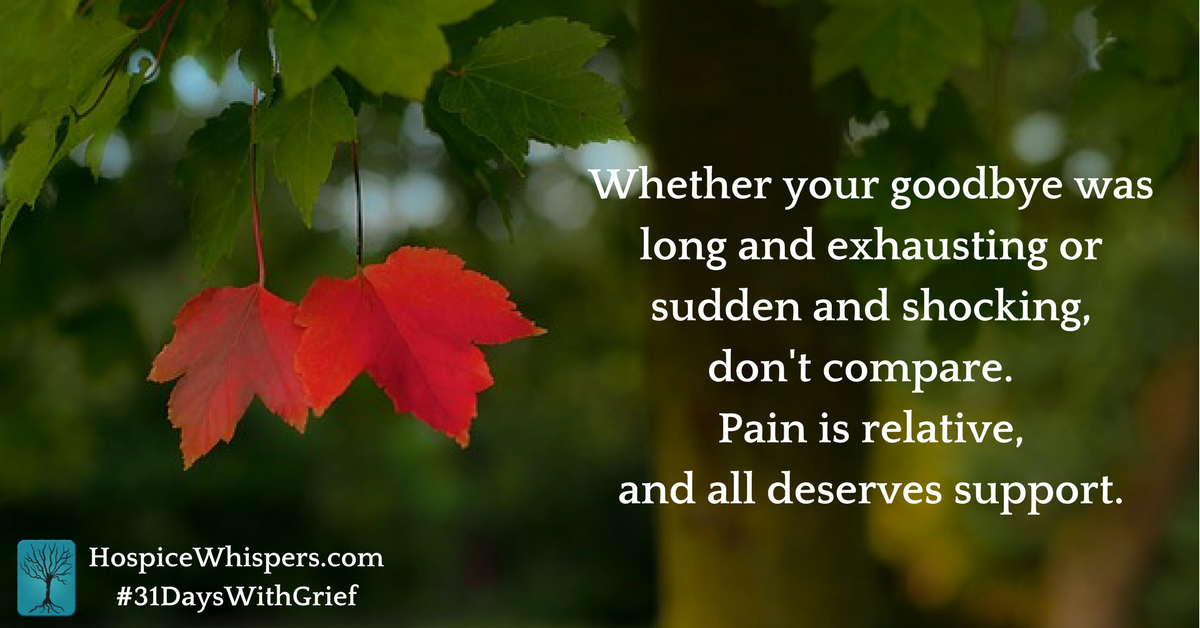31 Days of Walking with Grief: Others’ and Our Own
Day 16—The Pain of Long and Short Goodbyes
This is a month-long series to support persons grieving and those who love them. It includes content from “Sharing Our Stories: A Hospice Whispers Grief Support Workbook” available through Amazon and wherever books are sold.
We who counsel mourners regularly encourage persons to not compare experiences. Doing so can minimize one’s loss as being less significant than another’s, shutting down one’s willingness to grieve openly and receive the support they need and deserve. That serves no one.
This holds true for the varying time-frames over which a loved one dies.
Sudden, unexpected death can rock our world, leaving us feeling stunned in disbelief as we struggle to wrap our heads around what we do not want to accept as true. It reminds us that life can be capricious and that bad things do happen to good people, which can challenge all our existential beliefs and leave us feeling angry and afraid.
Having little to no time to say goodbye can significantly complicate our grief, as well, as the shock can take time to wear off.
The long, slow goodbyes of a protracted illness bring their own heartache and difficulties. Getting the chance to say goodbye is a gift paid for with weeks, months, or even years of watching someone you love suffer and go away bit by bit.
This prompts a series of griefs as we deal with the anticipation of waiting for the other shoe to drop, mourn each new loss, while exhaustedly and guiltily begging the universe to let it all be done.
Which would you choose?
Each person answers differently. It’s always interesting to hear both those who wish for the grass that looks so green on the other side and those who acknowledge how hard their circumstance is/was but accept it because of the gifts they find in their experience:
“I wish we could have said goodbye, but I’m glad he didn’t linger and suffer”.
“It wore us out in so many ways, but I wouldn’t trade a second of the time we had with her.”
Still others grapple with their lot:
“I can’t get over not having a chance to say I love you one more time. It haunts me, still.”
“Watching him suffer day after day was the cruelest thing I could imagine. It haunts me, still.”
We’ve no idea how someone views their situation, so we do not assume and we do not judge. We accept that pain is relative—the worst pain you’ve experienced is the worst pain you’ve experienced. There is no fair way to compare, and why would we? We let them be where they are and grieve exactly as they need.
What challenges did you find in your circumstance? What gifts did you come to see? What, if anything, remains for you to resolve for your own peace and sanity’s sake? What would it look like to be free from the things that hold you back? What would it take to get you there?
Whatever your grief looks like, however you answer these questions, I hope you find deep comfort and on-going support, exactly as you need it, and I truly hope this series is at least a small part of that which helps you.
Peace,
Carla
 Rev. Carla Cheatham, MA, MDiv, PhD, TRT has served hospices as a chaplain and bereavement coordinator. She’s the Section Leader for the Spiritual Caregivers Section of the National Hospice and Palliative Care Organization and an adjunct professor at the Seminary of the Southwest. Through her Carla Cheatham Consulting Group, Carla provides training and consulting for professional caregivers nationwide. She is the author of Hospice Whispers: Stories of Life and its companion volume, Sharing Our Stories: A Hospice Whispers Grief Support Workbook. Her next book, On Showing Up with Suffering: Others’ and Our Own, is set to publish in 2017.
Rev. Carla Cheatham, MA, MDiv, PhD, TRT has served hospices as a chaplain and bereavement coordinator. She’s the Section Leader for the Spiritual Caregivers Section of the National Hospice and Palliative Care Organization and an adjunct professor at the Seminary of the Southwest. Through her Carla Cheatham Consulting Group, Carla provides training and consulting for professional caregivers nationwide. She is the author of Hospice Whispers: Stories of Life and its companion volume, Sharing Our Stories: A Hospice Whispers Grief Support Workbook. Her next book, On Showing Up with Suffering: Others’ and Our Own, is set to publish in 2017.



Leave a Reply